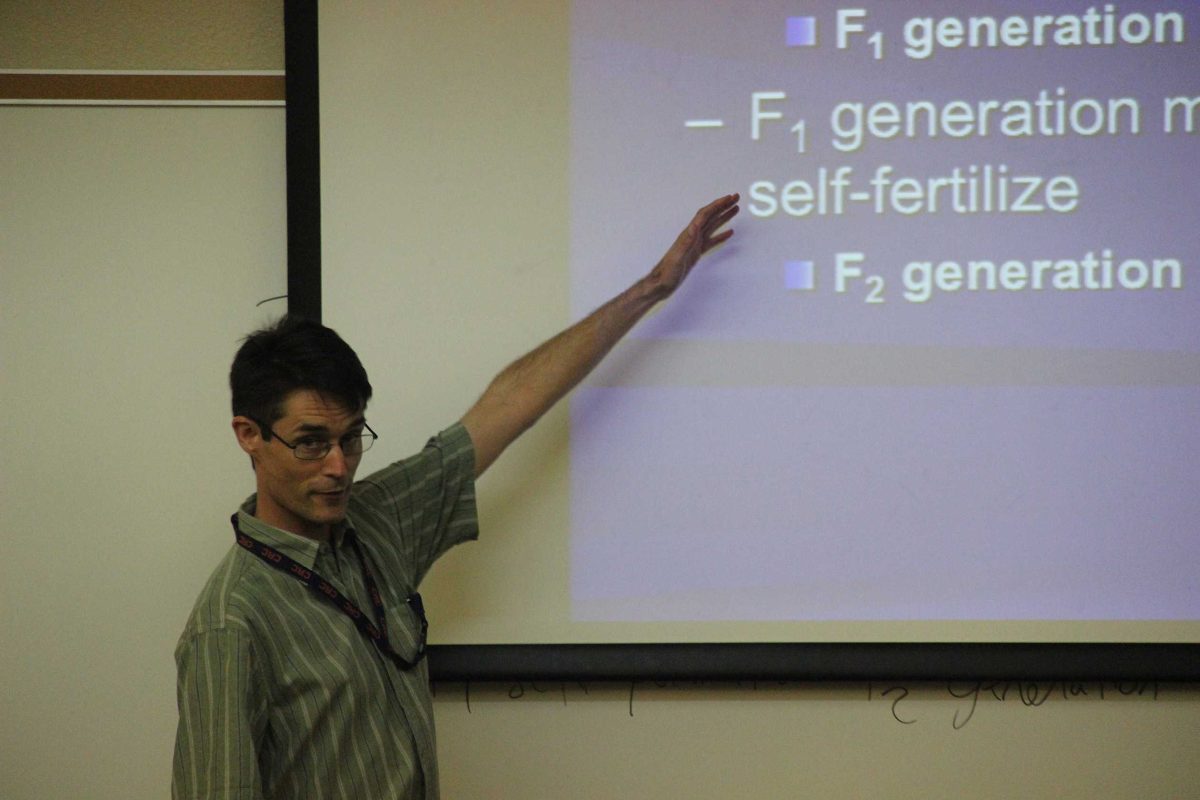CRC welcomes new wave of faculty
Biology Professor Eli Carlisle is one out of 15 of the new faculty hires at CRC. He teaches Biology 310 on Thursday’s in the LRC.
The 15 new faculty members who have been hired on campus this fall each bring a unique background and different perspectives to their departments.
Many of the new faculty members were former adjunct professors on campus while some came to Cosumnes River College from other colleges.
John Seamons was an adjunct professor at CRC for eight years and is now a part of the full-time staff. After his journey as a missionary for his church, he said he knew he wanted to teach. Seamons attended American River College and earned his bachelor’s degree in English.
“I, too, attended a community college and transferred to a CSU, while working 25 to 30 hours a week. I completed a master’s while married with three children,” said Seamons. “Because of these shared experiences, I hope I can better motivate and assist our students with the challenges that they face.”
From year to year it varies from how many new staffs are hired at Cosumnes; depending on the school budget, how many positions are available and how the student body is expanding.
Within the last decade, this has been the biggest group that has been hired.
“Because of all the new faculty, CRC is is able to offer more classes that weren’t available before, like engineering,” said Kristie West, public relations officer at Cosumnes River College.
“I think it’s great, it gives students the opportunity to get the classes they need and get out of here faster,” said West.
Nhat Nguyen, a mathematics professor, said her goal is to have a lively and open educational environment for all the students taking her course. One way she does this is by reminding her students that it is okay to be wrong sometimes and that being wrong is a natural part of learning.
“Mathematics is too often taught as a cold, distant science with an endless list of formulas and seemingly no connection between topics,” Nguyen said. “I bring excitement and a storyline to my classes, using energy and enthusiasm.”
Teresa O’Brien is a counselor who helps students with disabilities. On a daily basis she deals with students who encounter many different obstacles, but encourages them to speak up, feel comfortable and go to her for personal support.
“I try to tell students that what’s important is their education. I found that a little bit of help goes a long way,” O’brien said. “I’ve learned that a student with disabilities isn’t able to finish a test in an hour, we give them an extra half an hour, and they go from C’s to A’s because they could answer the last five questions.”
Alexander Peshkoff was an adjunct history professor for CRC for five years prior but is now full-time. Many students may know him through Movimento Estudiantil Chicano de Aztlan, an association for multi-racial clubs that learn about issues affecting Latin America, our communities and California in general.
He’s traveled to Jamaica, different parts of Latin America and to the Caribbean. His advice for future students is to “read, think deeply and travel.”
“I happen to come from a very poor neighborhood, an immigrant family, first generation to go to college and to graduate,” Peshkoff said. “That has shaped who I am and how I understand history.”
Nathan Miller is a communication studies professor who loves a good debate. He taught at Western Carolina University and was a talk show host for a podcast called “Finding Asheville.”
Going from teaching at a four-year university to a two-year college is a big change for Miller.
“The student body seems a lot more interested and passionate about their education versus a four-year university where maybe some of their parents were paying for their tuition and they weren’t sure why they were in the classroom,” Miller said.
Biology professor Eli Carlisle, grew up on an small island called San Jouan, where there wasn’t much to do. He often found himself outside; that’s when he discovered his passion for biology. He doesn’t like to rely on textbooks and handing out printed notes. He said he believes the most effective way for students to learn is by taking down notes and doing projects.
“The more background, the more perspectives you can give, hopefully we can reach out to more students that way,” said Carlisle.
“For the last several years, through the recession, it was two or three and we were jumping up and down over two or three new faculty hires,” West said. “So, this is a big class for us and we’re thrilled by it.”


Phillip Miller • Oct 9, 2015 at 10:01 am
If anyone needs to take a History class and would like to learn about U.S. History from a different perspective, Professor Alexander Peshkoff is a fantastic instructor who challenges students to go deep into Latin America’s History. This class will give you a “pluralistic view” as stated in our college’s vision statement, which is a powerful human relation skill to have! Congratulations to Professor Peshkoff and all the new hires! CRC is a great place! Peshkoff